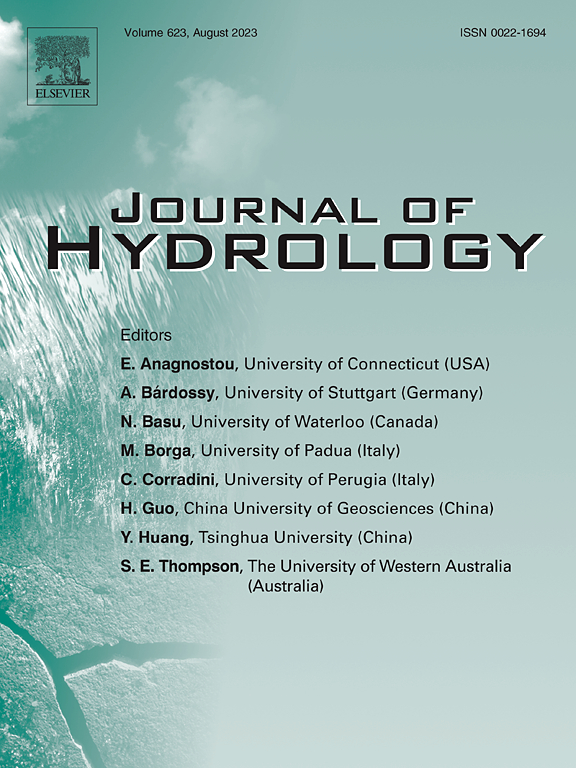Response of urban flood resilience to climate change: An exploration with a novel performance-based metric considering the socioeconomic impacts of damage costs
IF 5.9
1区 地球科学
Q1 ENGINEERING, CIVIL
引用次数: 0
Abstract
Climate change stimulates the emergence of floods and increases flood risk for communities, resulting in extensive casualties and economic loss. Thus, flood resilience has been the focus of much attention. Integrated and holistic metrics are important for an accurate urban flood resilience evaluation. However, performance-based metrics involving surface inundation do not consider the socioeconomic impacts of damage costs on the recovery ability of the urban systems. This hinders the investigation of climate change-induced effects on flood resilience. Therefore, this study proposed a performance-based resilience metric considering the negative impacts of flooding damage costs. The proposed metric was then piloted in a highly urbanized area in Osaka City, Japan to explore the responses of flood resilience to climate change. The results suggest that climate change exerts non-negligible pressure on the study area to maintain its economic characteristics during flooding. Rainfall intensity primarily affects the urban system’s most unfavorable state, while the total amount and duration of rainfall mostly impact the relatively stable state following flooding. Climate change severity is positively linked to the reduction in overall flood resilience. Continued climate change will further expand the spatial coverage of flood resilience losses on a global scale. Furthermore, the negative impacts of economic losses on flood resilience are more noticeable during rainfall events with higher rainfall intensities. This study improves the comprehensiveness of performance-based flood resilience evaluations and provides a reference for the effective enhancement of urban flood resilience under climate change.

城市抗洪能力对气候变化的响应:考虑到损害成本的社会经济影响的新型绩效指标探索
气候变化会引发洪灾,增加社区的洪灾风险,造成大量人员伤亡和经济损失。因此,抗洪能力一直是备受关注的焦点。综合全面的衡量标准对于准确评估城市抗洪能力非常重要。然而,涉及地表淹没的性能指标并没有考虑损害成本对城市系统恢复能力的社会经济影响。这阻碍了气候变化对洪灾恢复能力影响的研究。因此,本研究提出了一种基于绩效的抗灾能力指标,考虑了洪水损失成本的负面影响。然后,在日本大阪市的一个高度城市化地区对所提出的指标进行了试点,以探索洪水复原力对气候变化的响应。结果表明,气候变化对研究地区在洪水期间保持其经济特征造成了不可忽视的压力。降雨强度主要影响城市系统最不利的状态,而降雨总量和持续时间则主要影响洪灾后相对稳定的状态。气候变化的严重程度与整体抗洪能力的下降呈正相关。持续的气候变化将在全球范围内进一步扩大抗洪损失的空间范围。此外,在降雨强度较高的降雨事件中,经济损失对抗洪能力的负面影响更加明显。这项研究提高了基于绩效的抗洪能力评估的全面性,为气候变化下有效提高城市抗洪能力提供了参考。
本文章由计算机程序翻译,如有差异,请以英文原文为准。
求助全文
约1分钟内获得全文
求助全文
来源期刊

Journal of Hydrology
地学-地球科学综合
CiteScore
11.00
自引率
12.50%
发文量
1309
审稿时长
7.5 months
期刊介绍:
The Journal of Hydrology publishes original research papers and comprehensive reviews in all the subfields of the hydrological sciences including water based management and policy issues that impact on economics and society. These comprise, but are not limited to the physical, chemical, biogeochemical, stochastic and systems aspects of surface and groundwater hydrology, hydrometeorology and hydrogeology. Relevant topics incorporating the insights and methodologies of disciplines such as climatology, water resource systems, hydraulics, agrohydrology, geomorphology, soil science, instrumentation and remote sensing, civil and environmental engineering are included. Social science perspectives on hydrological problems such as resource and ecological economics, environmental sociology, psychology and behavioural science, management and policy analysis are also invited. Multi-and interdisciplinary analyses of hydrological problems are within scope. The science published in the Journal of Hydrology is relevant to catchment scales rather than exclusively to a local scale or site.
 求助内容:
求助内容: 应助结果提醒方式:
应助结果提醒方式:


